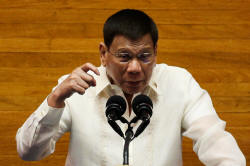|
The
move comes weeks after a global dirty money watchdog - the
Financial Action Task Force (FATF) - added the Southeast Asian
country to its grey list of countries under increased monitoring
https://www.reuters.com/business/global-dirty-money-watchdog-adds-malta-grey-list-keeps-pakistan-2021-06-25,
along with Haiti and South Sudan.
The Bangko Sentral ng Pilipinas (BSP) has vowed to work to
ensure compliance with FATF https://www.reuters.com/article/philippines-cenbank-fatf-idUSP9N2LN026
recommendations and exit the list no later than 2023.
The Bank Deposits Secrecy Bill will give the BSP increased
investigative powers, making it easier for the regulator to
examine suspicious bank accounts, and impose heavy penalties.
It will equip the BSP with tools "necessary to prove the
commission of fraud, serious irregularity or unlawful activity
if reasonable basis exists", the central bank said in a
statement.
The BSP has long pushed for such measures, but attempts by
previous administrations to amend or repeal the law to combat
tax fraud failed amid fears about breaches of privacy or being
used to harass political opponents.
Business groups, including the Bankers Association of the
Philippines, have thrown their support behind the bill.
In a bid to allay concerns about privacy, the BSP said the
results of any probe would not be arbitrarily disclosed, and may
only be shared with courts and other regulators if it was
necessary to prevent or prosecute a crime.
Despite its strict anti-money laundering rules, the Philippines
was at the centre of some high-profile bank frauds in recent
years, including the $81 million cyber heist https://www.reuters.com/article/us-cyber-heist-bangladesh-idUSKCN1PO19J
in 2016 involving money stolen from the Bangladesh central bank
account at the Federal Reserve Bank of New York.
(Reporting by Enrico Dela Cruz; Editing by Ed Davies)
[© 2021 Thomson Reuters. All rights
reserved.] Copyright 2021 Reuters. All rights reserved. This material may not be published,
broadcast, rewritten or redistributed.
Thompson Reuters is solely responsible for this content.

|
|





